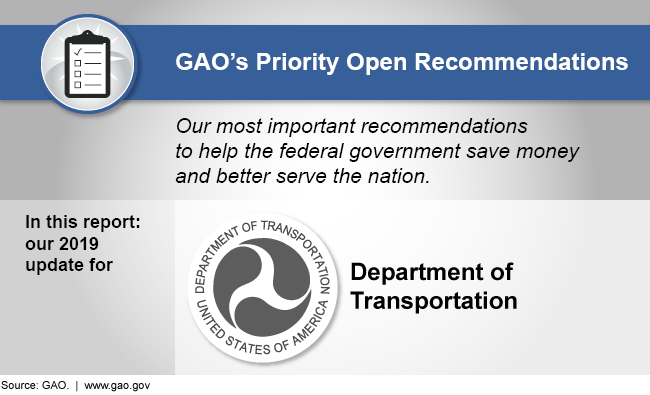Priority Open Recommendations: U.S. Department of Transportation
Fast Facts
Each year, we make more than 1,000 recommendations to help improve the federal government. We alert department heads to the recommendations where they can save the most money, address issues on our High Risk List, or significantly improve government operations.
This report outlines our 16 priority open recommendations for the Department of Transportation as of April 2019.
For example, in 2014 we recommended revising the methodology used to compare safety performance across trucking companies to better identify those at highest risk for crashing.
Since our previous letter in April 2018, DOT implemented 3 of our priority recommendations.

Graphic showing that this report discusses GAO's 2019 priority open recommendations for the Department of Transportation
Highlights
What GAO Found
In April 2018, GAO identified 13 priority recommendations for the U.S. Department of Transportation (DOT). Since then, DOT has implemented 3 of those recommendations by, among other things, addressing concerns related to vehicle cybersecurity by defining DOT's role in responding to vehicle cyberattacks, and addressing safety risks to oil and gas pipelines by updating emergency response regulations.
In April 2019, GAO identified 6 additional priority recommendations for OPM, bringing the total number to 16. These recommendations involve the following areas:
- funding surface transportation.
- addressing safety risks.
- cybersecurity risks.
- improving management of information technology (IT) workforce planning.
- improving federal grant management.
- Improving transportation readiness.
DOT's continued attention to these issues could lead to significant improvements in government operations.
Why GAO Did This Study
Priority open recommendations are the GAO recommendations that warrant priority attention from heads of key departments or agencies because their implementation could save large amounts of money; improve congressional and/or executive branch decision making on major issues; eliminate mismanagement, fraud, and abuse; or ensure that programs comply with laws and funds are legally spent, among other benefits. Since 2015 GAO has sent letters to selected agencies to highlight the importance of implementing such recommendations.
For more information, contact Susan Fleming at (202) 512-2834 or flemings@gao.gov.
